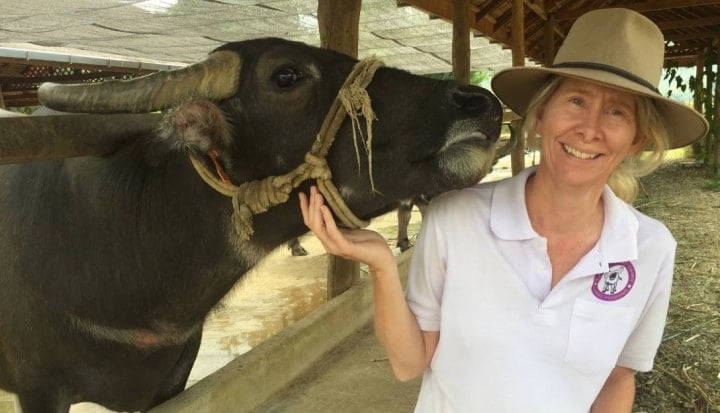Q 1. What is your inclusive business model?
Laos Buffalo Dairy is a commercial buffalo dairy in the heart of Laos. Our production facility makes yogurt, cheese and ice cream for sale on local and overseas markets. Locally, we distribute to highend hotels and restaurants and have a shopfront for tourists looking to visit and try one of our buffalo milk products. We have a buffalo breeding program and are not just selling products but encouraging the local community to use the buffalo milk for the health benefits. In the breeding program we rent buffalo from local families, providing them with a regular income stream from an underutilised resource, namely female buffalo.
Q 2. When did yo u come to Laos and what were some of the biggest challenges in setting up the business?
I came to Laos after many years of working for multi-national corporations. We (Susie and co-founders Steven and Rachel) discovered that we had complementary skill sets and were ready for a new adventure. We moved in 2014 and soon realised that in this land full of buffalo, a dairy industry was non-existent. After some sleepless nights and much research, we came to the conclusion that we could build the industry ourselves and the local community could benefit in the process.
The biggest challenge we had in the beginning was gaining the trust of the farmers. We needed to demonstrate how better care could benefit their buffalo and their family income. Farmers were reluctant to rent us their pregnant buffalo. With a wet season and torrential downpours, reaching and transporting buffalo that farmers had agreed to rent us was – and remains! – a huge challenge.
Q 3. Where have you seen the most significant change?
The most significant change is in the attitudes of the farmers with whom we work. In the villages around us, approximately 40 per cent of calves die before six months of age. After the first crossbred calf was born in our breeding program, word spread quickly and more farmers wanted to participate. Farmers saw that the buffalo were fatter from eating a healthier diet, more babies were coming off the farm, and the few crossbreeds that were starting to be born were bigger than the buffalo in their herds.
With the trust that developed, we noticed that farmers were prepared to go another step and sit down and learn about how they could milk their own buffalo and use the milk to help their children become healthier.
Q 4. Has COVID-19 prompted (or forced) or you to change the way you operate?
As a tourist-dependent enterprise we have had re-think our model to survive. We are looking at other income streams, like exporting our dairy products to Japan. We have been working with a Japanese distributor for over a year now to meet the quality of product required, in packaging acceptable to the Japanese market. We were working on a plan to upgrade equipment and bring on more buffalo to provide the regular supply and volume needed for export which for our Japanese customer is two tons of cheese every month. We have focused on this export opportunity since COVID has taken the tourists away, with no clear return date in sight.
Q 5. Why did you partner through the BPP?
The BPP partnership has helped us to reach out to more remote villages and expand the network of farmers working with the dairy. Currently 35 per cent of Laos children are chronically malnourished.
The partnership approach has helped us to leverage the skills and experience of all the partners – for buffalo milk promotion this has been especially impactful through our work with the Provincial Health Department.
By partnering with BPP we are able to scale up our training for farmers on animal husbandry and introduce dairy into the local diet to improve nutrition. Demonstrating improved animal husbandry as well as milking techniques and correct processing of the milk and how to introduce it into the diet.
DFAT (the Australian Department of Foreign Affairs and Trade) has been very flexible and responsive to our needs. Especially given the evolving situation with COVID-19, we’ve appreciated their collaborative approach and navigating challenges together.
We have big plans and hope to reach many more communities – watch this space!
About the partnership
The Business Partnerships Platform (BPP) supports partnerships between the Australian Department of Foreign Affairs and Trade (DFAT) and inclusive businesses to create both development impacts and sustainable commercial returns through their core business operations.
Click here to learn more about our Call for Partnership to support COVID-19 Recovery, including opportunities in Bangladesh, Nepal, Philippines, Samoa, Sri Lanka and Tonga










